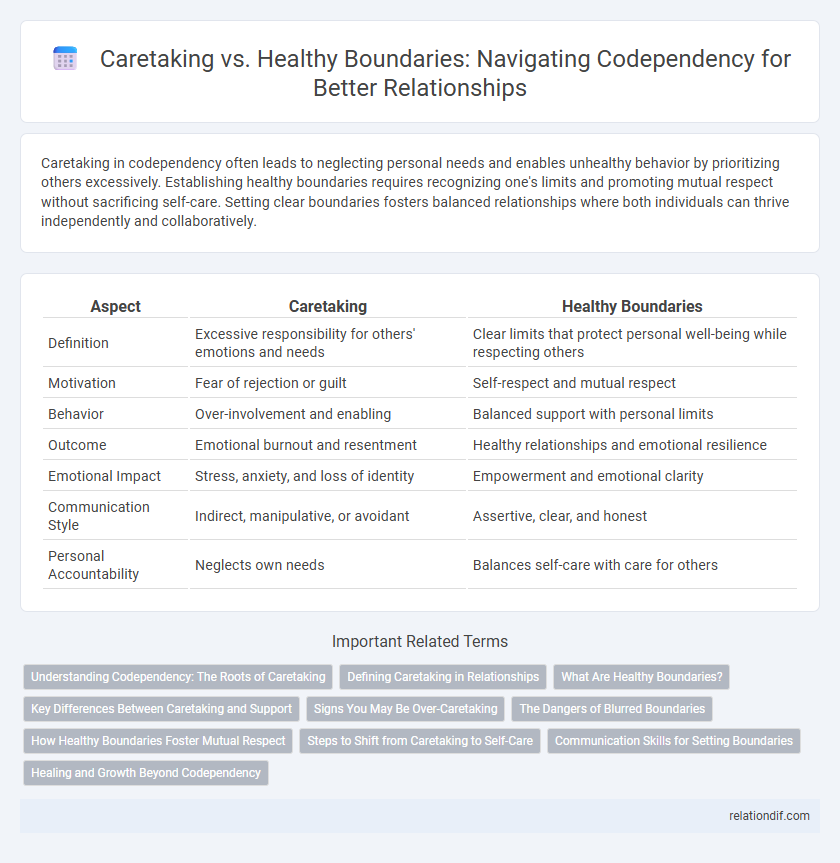Caretaking in codependency often leads to neglecting personal needs and enables unhealthy behavior by prioritizing others excessively. Establishing healthy boundaries requires recognizing one's limits and promoting mutual respect without sacrificing self-care. Setting clear boundaries fosters balanced relationships where both individuals can thrive independently and collaboratively.
Table of Comparison
| Aspect | Caretaking | Healthy Boundaries |
|---|---|---|
| Definition | Excessive responsibility for others' emotions and needs | Clear limits that protect personal well-being while respecting others |
| Motivation | Fear of rejection or guilt | Self-respect and mutual respect |
| Behavior | Over-involvement and enabling | Balanced support with personal limits |
| Outcome | Emotional burnout and resentment | Healthy relationships and emotional resilience |
| Emotional Impact | Stress, anxiety, and loss of identity | Empowerment and emotional clarity |
| Communication Style | Indirect, manipulative, or avoidant | Assertive, clear, and honest |
| Personal Accountability | Neglects own needs | Balances self-care with care for others |
Understanding Codependency: The Roots of Caretaking
Codependency often stems from deep-rooted patterns of caretaking where individuals prioritize others' needs over their own emotional well-being. This imbalance creates difficulty in establishing healthy boundaries, leading to enmeshment and loss of autonomy. Recognizing these origins is crucial for developing self-awareness and fostering relationships based on mutual respect and individual self-care.
Defining Caretaking in Relationships
Caretaking in relationships involves assuming responsibility for another person's emotions, decisions, and well-being, often at the expense of one's own needs and boundaries. This behavior typically stems from a desire to gain approval or avoid conflict but can lead to imbalance and emotional exhaustion. Healthy boundaries, in contrast, encourage mutual respect and autonomy, promoting individual growth while maintaining supportive connections.
What Are Healthy Boundaries?
Healthy boundaries are clear, respectful limits that protect individual well-being and promote balanced relationships, distinguishing personal needs from those of others. They enable individuals to communicate their feelings and expectations assertively without overextending themselves or enabling unhealthy dependency. Practicing healthy boundaries fosters mutual respect, emotional autonomy, and prevents caretaking behaviors from escalating into codependency.
Key Differences Between Caretaking and Support
Caretaking often involves taking responsibility for another person's emotions or problems, leading to over-involvement and blurred boundaries, whereas healthy boundaries emphasize mutual respect and independence. Support empowers individuals by encouraging autonomy and emotional resilience without assuming control or blame. Establishing clear distinctions between caretaking and support is crucial to fostering balanced relationships and preventing codependency.
Signs You May Be Over-Caretaking
Constantly prioritizing others' needs while neglecting your own emotional well-being is a key sign of over-caretaking in codependency. Difficulty saying no, feeling responsible for others' feelings, and experiencing burnout or resentment indicate unhealthy boundary patterns. Recognizing these signs helps establish healthier relationships with balanced self-care and mutual respect.
The Dangers of Blurred Boundaries
Blurred boundaries in codependency often lead to caretaking behaviors that undermine self-respect and personal growth, causing emotional exhaustion and resentment. Without clear limits, individuals may overextend themselves, enabling unhealthy patterns and diminishing their sense of autonomy. Recognizing and establishing healthy boundaries is essential to prevent manipulation, maintain emotional well-being, and foster balanced relationships.
How Healthy Boundaries Foster Mutual Respect
Healthy boundaries create clear limits that protect personal well-being while encouraging open communication and trust between individuals. This balance reduces the risk of caretaking behaviors that lead to codependency by promoting autonomy and accountability. Establishing and respecting boundaries supports mutual respect and enhances relationship quality by ensuring both parties' needs are acknowledged without enabling unhealthy dependence.
Steps to Shift from Caretaking to Self-Care
Setting clear, healthy boundaries involves recognizing personal limits and asserting needs without guilt. Prioritizing self-care routines like regular rest, hobbies, and seeking support fosters independence and emotional resilience. Reframing caretaking impulses into acts of self-respect encourages sustainable relationships and reduces burnout.
Communication Skills for Setting Boundaries
Effective communication skills are essential for setting healthy boundaries, especially in codependency dynamics where caretaking behavior often blurs personal limits. Using assertive language, clear "I" statements, and consistent verbal cues helps individuals express their needs without guilt or aggression. Practicing active listening and empathy during conversations reinforces mutual respect and supports boundary maintenance in relationships.
Healing and Growth Beyond Codependency
Caretaking in codependency often leads to sacrificing personal needs, fostering imbalance and emotional exhaustion. Establishing healthy boundaries involves recognizing one's limits, promoting self-respect, and allowing others to take responsibility for their actions. Healing beyond codependency requires cultivating self-awareness and resilience, enabling growth through mutual respect and interdependent relationships.
Caretaking vs Healthy Boundaries Infographic

 relationdif.com
relationdif.com